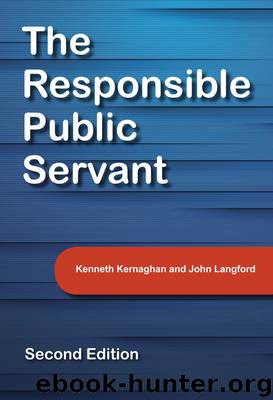The Responsible Public Servant by Langford John Kernaghan Kenneth

Author:Langford, John, Kernaghan, Kenneth [Kernaghan, Kenneth]
Language: eng
Format: epub
ISBN: 9781550610062
Publisher: BookBaby
Published: 2014-03-14T16:00:00+00:00
CASE 5.1: ALL IN THE FAMILY
The following conversation takes place between two middle managers in a provincial Department of Regional Industrial Expansion.
Mike: I understand that you’ve had a request for financial assistance from a computer manufacturer.
Frances: We’ve been flooded with requests lately, Mike. This has been a bad year for this province. But I think I know the company you mean. It’s in Spruceville, isn’t it?
Mike: Yes, that’s the one. They’ve been in touch with me, and apparently they’re in a real crisis situation. Frankly, Frances, they’re afraid that they’ll have to shut down if they don’t get some financial help soon.
Frances: That doesn’t sound good. But I just received their application this week. With the pile of applications on my desk right now, it’ll be another month or two at least before I get to it.
Mike: That’ll be too late. The owner of the firm is married to my sister, so I told him I’d look into the situation. I think their financial situation is critical enough to justify putting their application near the top of the pile.
Is Mike in a real, apparent, or potential conflict of interest situation here? Is the firm’s reported dire financial situation a sufficient justification for Mike to involve himself in the application vetting process? How should Frances respond to Mike’s request? How would the average citizen react to this situation? Would the case be handled any differently if Mike was not related to the owner of the firm? Should information about the firm’s critical financial situation be ignored because of the source of the information?
Accepting Benefits
As noted above, the acceptance of benefits can take the form of bribery at the one extreme and the receipt of benefits of nominal value at the other. A wide range of benefits can be conferred on public servants, including gifts, meals, free travel, paid vacations, entertainment and money.
Cases in which a public servant accepts benefits that are of such magnitude that the fitting response is prosecution under the Criminal Code are comparatively easy to handle. The real difficulty comes with benefits that fall into the grey area, such as meals associated with a business meeting, a bottle of liquor at Christmas time, an evening at the theatre, an honorarium for a speech or a gift that may be perceived as having more than nominal value. More recently, offers of the keys to a condominium or tickets to an Ottawa Senators hockey game have been replaced by fully paid opportunities to take part in a “professional development workshop” at a high-end resort. Is this likely to be an educational experience or an opportunity to spend quality time with the corporate sponsors who also want your organization to buy their data management software or change a regulation in their favour? An informal guideline that is reported to have existed in earlier and simpler times was that public servants should only accept a gift that they could consume within a 24-hour period. The inadequacy of such a guideline is obvious
Download
This site does not store any files on its server. We only index and link to content provided by other sites. Please contact the content providers to delete copyright contents if any and email us, we'll remove relevant links or contents immediately.
The Secret History by Donna Tartt(19010)
The Social Justice Warrior Handbook by Lisa De Pasquale(12179)
Thirteen Reasons Why by Jay Asher(8878)
This Is How You Lose Her by Junot Diaz(6865)
Weapons of Math Destruction by Cathy O'Neil(6253)
Zero to One by Peter Thiel(5776)
Beartown by Fredrik Backman(5722)
The Myth of the Strong Leader by Archie Brown(5487)
The Fire Next Time by James Baldwin(5418)
How Democracies Die by Steven Levitsky & Daniel Ziblatt(5207)
Promise Me, Dad by Joe Biden(5135)
Stone's Rules by Roger Stone(5070)
A Higher Loyalty: Truth, Lies, and Leadership by James Comey(4942)
100 Deadly Skills by Clint Emerson(4904)
Rise and Kill First by Ronen Bergman(4766)
Secrecy World by Jake Bernstein(4733)
The David Icke Guide to the Global Conspiracy (and how to end it) by David Icke(4691)
The Farm by Tom Rob Smith(4494)
The Doomsday Machine by Daniel Ellsberg(4477)
